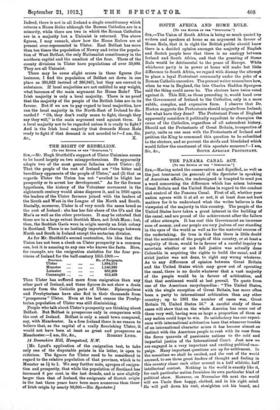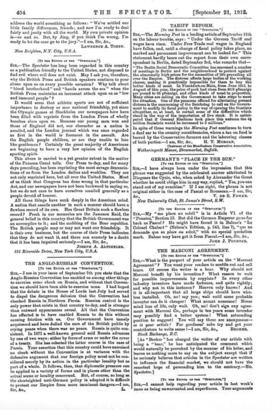THE PANAMA. CANAL ACT.
(To THE EDITOR OF TEl " SFECTATOB..”) SIR,—Having noted the conservative and dignified, as well as the just treatment (in general) of the Spectator in speaking of American affairs, the undersigned is tempted to send you a word concerning the difference which has arisen between Great Britain and the United States in regard to the conduct and control of the Panama Canal. First of all, whether your nation agrees with it at all or not, it at least does not hurt matters for it to understand what the writer believes is the viewpoint of the majority in this country. The people of the United States have taken a great interest in the building of the canal, and are proud of the achievement after the failure of other attempts. It has cost this Government an immense sum of money, and our people are very jealous of our standing in the eyes of the world as well as for the material success of the undertaking. So true is this that there is little doubt that the sentiment of the people of this country, or at least a majority of them, would be in favour of a careful inquiry to ascertain whether or not full justice was actually done Columbia in acquiring the rights to build the canal, and if strict justice was not done, to right any wrong whatever. As to any difference of opinion between Great Britain and the United States which may grow out of operating the canal, there is no doubt whatever that a vast majority of the people would be in favour of arbitration, and that that sentiment would at last prevail. To quote from one of the American encyclopmdias : " The United States, with the single exception of Great Britain, has more often been a party to international arbitration than any other country; up to 1901 the number of cases was, Great Britain 70, United States 56." A careful study of these cases will show that on the whole America has come out of them very well, having won as large a proportion of them as any nation could hope to win. So satisfactory has our experi- ence with international arbitration been that whenever trouble of an international character arises it bas become almost an instinct with the American people to rush with its case from the fierce quarrels of passionate nations to• the cold and impartial justice of the International Court. Just now we are engaged in a very important and exciting political cam- paign. Many important questions are up for settlement. In the meantime we shall be excited, and the rest of the world amused, to see three great leaders of thought and feeling in this country chase each other around in a half athletic, half intellectual contest. Nothing in the world is exactly like it, for each particular nation furnishes its own particular kind of political show. However, on November 6th next the world will see Uncle Sam happy, clothed, and in his right mind. He will pull down his vest, straighten out his beard, and
address the world something as follows : " We've settled our little family differences, friends ; and now I'm ready to deal fairly and justly with all the world. My own private opinion is—so and so. But, by Jing, if you think I'm wrong, I'm ready to let the case go to the jury."—I am, Sir, &c., New Brighton, N.Y. City, U.S.A. LAWRENCE A. TOEPP.











































 Previous page
Previous page